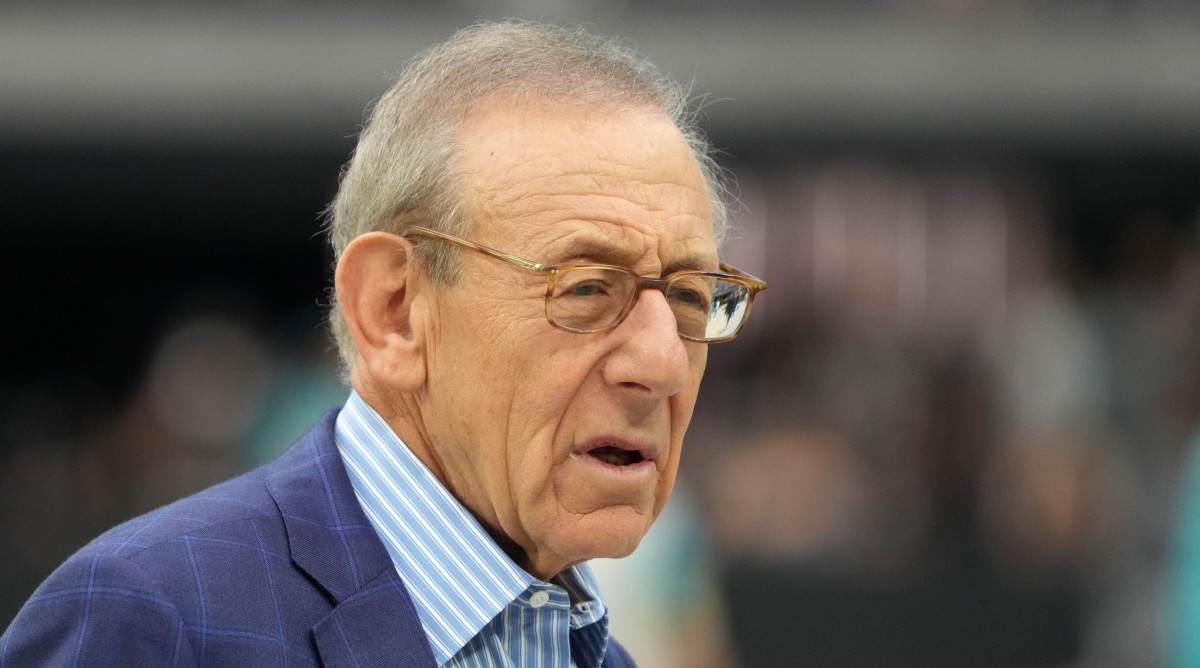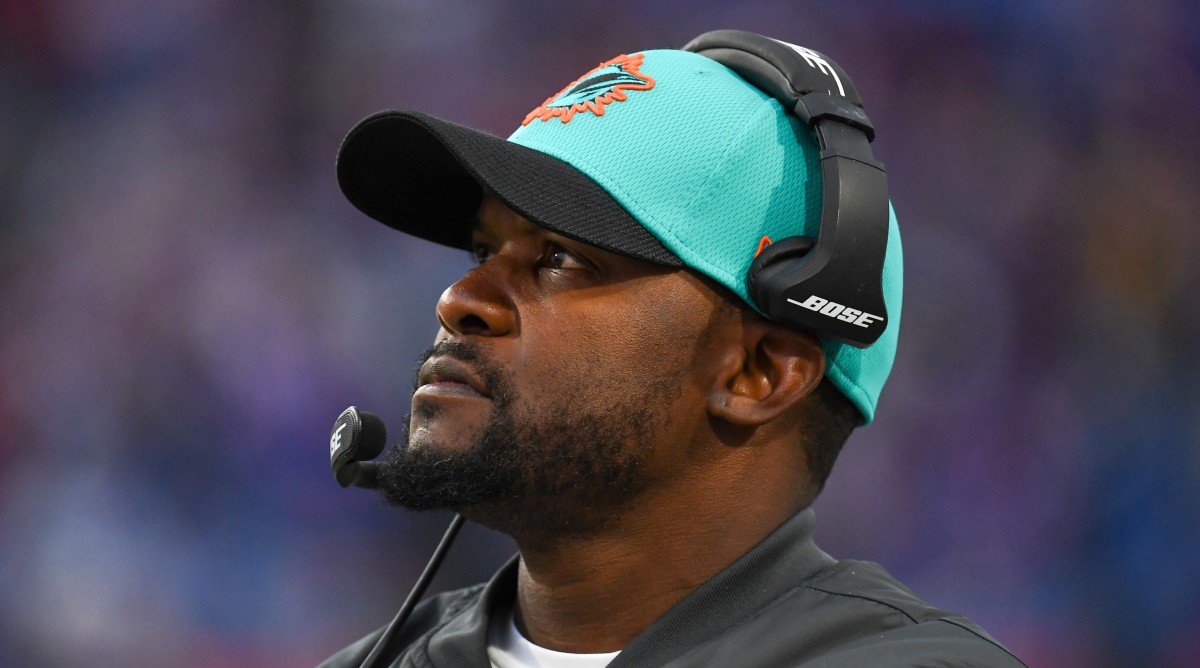Brian Flores Is Fearless Enough to Force the NFL’s Hand
Brian Flores said he walked into an interview with the Giants last week feeling “humiliation, disbelief and anger.” Prior to his meeting, he received text messages from his former boss and mentor, Bill Belichick, accidentally indicating that the Giants’ minds were already made up and that Flores would not receive the job.
Flores, speaking on CBS in the first televised interview he did in support of a lawsuit he filed on Feb. 1 against the NFL, the Giants, Broncos, Dolphins and “John Doe teams 1–29” alleging racist hiring practices, was called both “brave” and “bold” by host Gayle King. Regardless of how his suit turns out, King’s words were deliberate. Flores, admitting as much in the filing, knows he may never coach professionally again.
The reasons for this are twofold. First, Flores put a name, and some potentially troubling anecdotes, to a plight we’ve known has existed for decades. There is just one Black head coach (Mike Tomlin) in a league that is composed of more than 70% Black players. Behind the scenes, countless prospective head coaches of color have voiced their concerns about the legitimacy of the interview process, which requires that clubs interview at least two external candidates of color for their general manager, head coaching or coordinator vacancies.
Second, Flores not only called out specific NFL legends and owners, but accused them of offering cash bonuses for losing and showing up to interviews unprepared and hungover. Among the allegations:
• He made public text messages from Patriots coach Bill Belichick, in which Belichick said he was “hearing from Buffalo & NYG that you are their guy” before realizing his information was in reference to Brian Daboll, not Flores.
• He alleged that then Broncos general manager John Elway and then team president Joe Ellis showed up an hour late to his interview “completely disheveled,” suggesting that they had been out drinking the night before and attended their meeting with Flores merely to keep up appearances.
• He claimed that Miami Dolphins owner Stephen Ross offered him an additional $100,000 for each loss he sustained during the 2019 season in order to guarantee Miami a higher draft pick. He also accused Ross of tricking him into a meeting on his yacht with a quarterback who was still under contract with another team. Flores said he refused in both scenarios.
The Broncos have called these allegations “blatantly false.” The Giants, in their own statement provided to SI, said Flores was in consideration to be their head coach until the “eleventh hour” and that they were pleased with the course of their interview process that led to Daboll getting the job. Flores was one of three coaches of color the Giants interviewed for their head coaching vacancy along with Bills defensive coordinator Leslie Frazier and Giants defensive coordinator Patrick Graham. (Graham, as an in-house candidate, did not satisfy the Rooney Rule.) The Dolphins, in a statement provided to Sports Illustrated, said they “vehemently deny any allegations of racial discrimination.” They did not address Flores’s accusation that Ross tried to get him to tamper with another active quarterback, except to say that “the implication we acted in a manner inconsistent with the integrity of the game is incorrect.” A comment on that specific allegation was not provided.

In the ensuing hours after the lawsuit, former Browns head coach Hue Jackson, who is Black, alleged that the Browns owner Jimmy Haslam paid Jackson, chief strategy officer Paul DePodesta and current general manager Andrew Berry bonus money for tanking in 2016 and ’17. Responding to a tweet from Kimberly Diemert, the executive director of his charitable foundation, Jackson wrote that he stood with Flores and that he could back up every word of claims about tanking.
Flores’s attorneys said that more coaches have reached out to them about cash bonuses for losing games. They also claim to have “corroborating evidence” of Flores’s allegation that Ross offered him $100,000 for every additional loss.
The lawsuit comes at a sobering time for a league that has battled poor optics for over a decade specifically on the coaching diversity front. This cycle is shaping up to be overwhelmingly homogeneous. All four confirmed hires—Josh McDaniels, Nathaniel Hackett, Matt Eberflus and Brian Daboll—are white. As of the publication of this column, the Vikings were reportedly near a contract with Jim Harbaugh. The Texans conducted multiple interviews with Josh McCown, a former NFL quarterback who has never held a professional coaching position.
Two of the last three coaches to be fired after one year are Black. David Culley overcoached a tanking Houston roster to four wins; Steve Wilks tried to navigate a flat-lining Cardinals roster with Josh Rosen under center. The third one-and-done coach was Urban Meyer, who allegedly kicked one of his players (Meyer denied the allegation), appeared wholly disinterested in large portions of the job and skipped a team flight to engage in eye-opening behavior at a bar with a woman who was not his wife.
When the Raiders hired Jon Gruden back in 2018, owner Mark Davis gushed about the move as a completion of a yearslong chase to secure the coach of his dreams. In the midst of doing so, he clearly admitted, without saying so, that the minority interviews that took place to satisfy the Rooney Rule were nothing more than stagecraft given how infatuated he was with Gruden. Juxtaposed against the struggles of Black coaches like Chiefs offensive coordinator Eric Bieniemy, who has yet to receive a head coaching job despite multiple trips deep into the playoffs and a Super Bowl victory, it paints a vivid picture of a league seen through entirely different lenses depending on a coach’s skin color.
Combined with the serious allegations of tanking, this represents one of the most serious crises the league has faced in modern times, dropped in their laps just a few days before the Super Bowl.

What comes next will no doubt be the NFL’s attempt to corral and control, though the expected spin machine inside 32 club facilities will have a harder time scrambling Flores’s record to fit a narrative. The 40-year-old was viewed as a rising star within the business just a few short years ago. He had winning seasons in two of his three years in Miami and won five games with a roster in 2019 that was bad enough to invite widespread speculation that the Dolphins were tanking. He filed this lawsuit despite being an active candidate in two remaining head coaching searches, in Houston and New Orleans. His lawyers said Wednesday that they filed the suit before a second conversation, and first formal interview with, the Giants.
It’s hard to imagine that any legal punishment will be handed down. But Flores’s willingness to take on an alleged, nefarious NFL backworld largely hidden from plain view will back up against the wall people who rarely feel the need to answer for their behavior. His willingness to allege an owner is cheating, to release text messages of arguably the sport’s most revered head coach, to accuse one of its legendary players and franchise executives, John Elway, of unprofessionalism, is an act of defiance amid a sea of coaches who have long ago accepted that the league’s current power structure provides them with little recourse.
Flores appears ready to pay the price for speaking out loud his version of the NFL. Will the rest of the league plug their ears and pretend it isn’t happening, or finally decide to listen? The league already had a diversity issue on its hands. Now it has a competitive integrity issue on their hands. They have the perception of unprofessionalism, of secret cash payments, of the idea that much of what we believe about the NFL is not so.
More NFL Coverage:
• How Tom Brady Made Greatness Seem Routine
• The Bengals Are NFL’s Best Cinderella Story in Decades
• Sean McVay Reached Back to the Past to Inspire the Rams
• MAQB: Washington Has Plenty to Pitch to a Veteran QB
